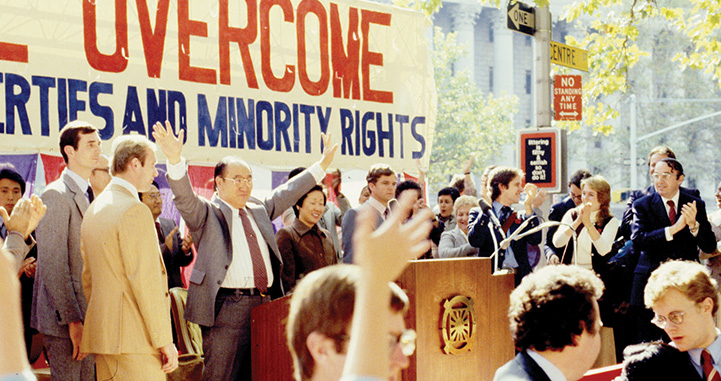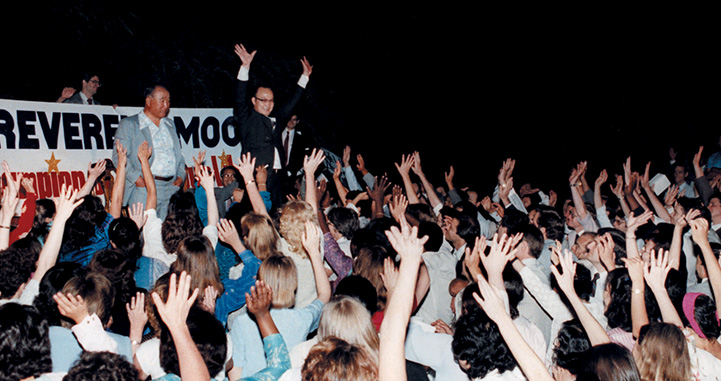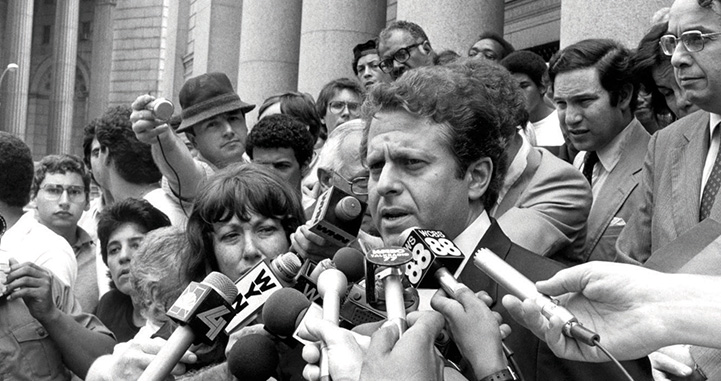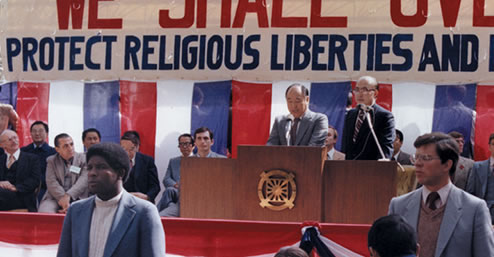This Week in History, March 30-April 5
This Week in History briefly lists significant events in the history of the Unification Church, the lives of the Founders, and world events that are important to Unificationists. This installment covers the week of March 30-April 5.
April 1, 1982

True Father acknowledging the crowd following his address.
True Father’s trial begins in New York
Opening arguments began in the infamous court trial of United States vs. Sun Myung Moon, on April 1, 1982, leading up to and during the trial; True Father’s supporters charged that the prosecution was motivated by racial and religious prejudice. At a rally outside the courthouse in lower Manhattan’s Foley Square, True Father famously stated, “If my skin were white and my religion Presbyterian, I would not be here today.” Though Father’s attorneys had requested a bench trial alleging that it was difficult to find an unbiased jury, the prosecution objected and the judge denied the motion. The trial lasted six weeks and was held in the U.S. District Court for the Southern District of New York.

Members say farewell hours before True Father departs for Danbury Correctional Facility, July 20 1984.
On May 18, 1982, the jury returned a guilty verdict, and on July 16, 1982, the judge sentenced True Father to 18 months in prison and a $25,000 fine. True Father’s legal team filed every appeal motion available but was ultimately denied. Ironically, in spite of all this, the movement emerged from what Unificationists term “the Danbury Course” on more solid ground than it had been on before. The reason for this was that American public opinion changed. A substantial number of influential Americans, including many of the libertarian persuasion, concluded that True Father had gotten a raw deal. His imprisonment led to an outcry from religious leaders and civil rights activists, who joined together in solidarity to protest what they saw as the unjust persecution of a religious leader. The movement deftly organized some of this sentiment into a series of “Rallies for Religious Freedom” and amicus curiae briefs supporting True Father’s appeal to the U.S. Supreme Court. However, the spontaneous support that emerged in op-ed pieces was more effective and consequential. More than any other sequence of events, the Danbury Course was the fulcrum around which the history of the Unification movement in America turned at the time.

Harvard Law Professor Lawrence Tribe speaks out on True Father’s behalf.
April 5, 1973
True Father meets president of South Vietnam, Nguyễn Văn Thiệu
On April 5, 1973, True Father met with the visiting president of South Vietnam, Nguyễn Văn Thiệu. According to the Freedom Leadership Foundation (FLF) Special Assistant Mike Leone, “The meetings were very, very successful.”
In the late sixties and early seventies, one of True Father’s main goals was “to prepare for the fight against communism.” Since 1969, the FLF had spearheaded the Victory Over Communism (VOC) efforts in the United States for the Unification Movement. Through the organization, True Father met numerous United States senators and congressmen in the early months of 1973, including President Thiệu. The meetings were an important step in developing the campaign to fight communism, something that would become one of the defining characteristics and focal points of the movement in the years to come.

